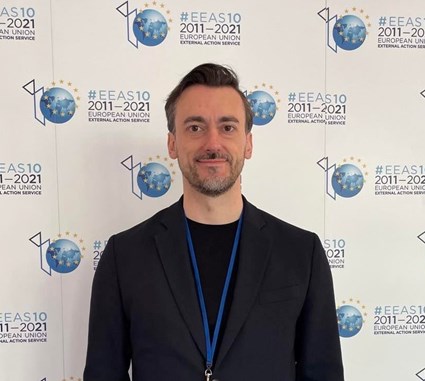Meet SSE alum Alen Musaefendic (Senior Analyst at the Swedish Psychological Defence Agency, stationed in Brussels at the European External Action Service)

Using his drive to shape real-world events, Alen Musaefendic, SSE alum and Senior Analyst at the Swedish Psychological Defence Agency, stationed in Brussels at the European External Action Service, focuses on fighting disinformation and hybrid threats in the Western Balkans and beyond.
1. Describe your role and what it is that you do overall and on a day-to-day basis.
My role is partly to fight information manipulation and foreign interference in the Western Balkans. The aim of malign actors in the region, notably Russia, is to sabotage and derail the EU-path which all six Western Balkan countries have taken. Some actors seek to ferment division and unrest as a way to retain influence in the region, and it is in our interest to stop that from happening. I support this work through monitoring and analysis of the information environment in the region, and sharing the findings within the EU-institutions and to various actors on the ground. It would be impossible to affect change without close contact with local journalists, media professionals, academics, activists, civil servants and politicians. So I do a lot of networking as well, trying to build resilience against foreign information manipulation and interference in all spheres of society. The Western Balkan countries belong in the EU and the main goal for me is to help them get there.
2. What interested you about working in foreign and security policy?
I have been fascinated with foreign and security policy since I was very young. It has to do with me growing up in a war-torn country, Bosnia-Herzegovina, and early on grasping the old adage: “Just because you do not take an interest in politics doesn’t mean politics won’t take an interest in you.” Democracy in former Yugoslavia was young and fragile, but it is inherently vulnerable everywhere, including in Sweden today. No society is spared from malign foreign influence, disinformation and information manipulation. Being in the front lines of that battle is very rewarding and almost tailor made for somebody with my interests and personal background.
3. What is most exciting about your work at the moment? Where do you think your field is going in the next 5-10 years.
Each aspect of my work is in a transformative phase. The Russian aggression against Ukraine has changed everything. It was prepared and is being maintained by an enormous disinformation and propaganda machine. China and Iran are using some of the same techniques. Disinformation, fake news, propaganda, are as old as humanity. But the scale and speed with which it is spread has grown exponentially. The EU, Sweden, and other parts of the world, are now finding ways to tackle it without forgoing democratic principle of free speech and debate. In that way, it as a nascent field where everything is exciting. Everybody is getting involved, from governments to think-tanks to academia to NGOs. The role of AI in spreading and/or countering disinformation in 10 years is on everybody’s lips but nobody has the answer.
The Russian aggression has had direct consequences on the EU accession process in the Western Balkans. For example, my home country of Bosnia and Hercegovina was recently declared an official candidate. There is a whole new momentum in EU enlargement which I am eager to seize.
4. How did your time/education at SSE help guide you to the career journey you have embarked on?
The students are what makes SSE special. The breadth of interests I encountered among them was a daily inspiration and the ultimate career guide. Some knew exactly where they would be in 20 years, others could not decide on a major, but almost everybody had suggestions and ideas about where to go next. Despite my early interest in foreign and security policy, I did not picture myself working in the field. I saw SSE as a bridge to an investment bank or a consultancy firm. Unsurprisingly, it was a classmate at SSE who introduced me to the world of think-tanks, lobbying and political writing in Sweden, and opened venues I did not know existed. This inspired me to major in economics instead of finance, which I've never regretted. If you want to understand how society works, economics is a rigorous way to go about it. Upon graduating from CEMS, a year of travel and multi-lingual socializing, it is difficult to go back so I knew my career had to have an international component.
5. Following your time studying, do you have any words of wisdom or advice you would like to share with our current students?
Do the schoolwork but don't forget the other opportunities SSE is offering. Go to as many company presentations as you can, not necessarily to hunt for jobs and internships at each one, but to learn what suits you, or just to learn. Apply for CEMS if you are eligible, it was one of the best choices I ever made. You will acquire knowledge, skills, and anecdotes from abroad that will last a lifetime. Be social but do not “network”. Long-lasting connections and mutual benefits are most likely to be grounded in genuine friendship.
6. What are three words that sum up your time at SSE?
Exciting, intensive, life-changing.

